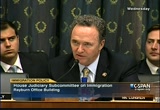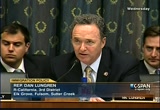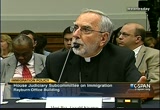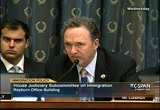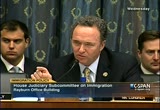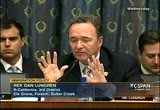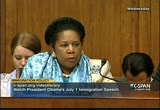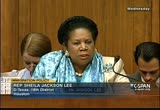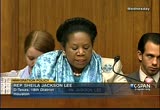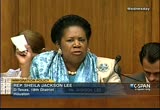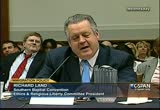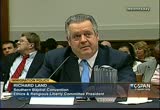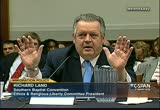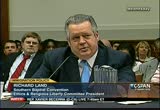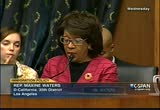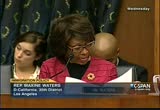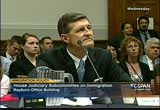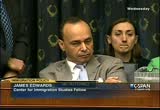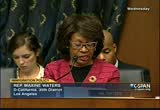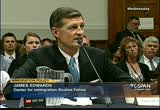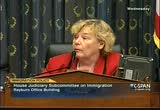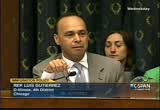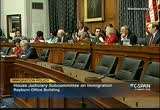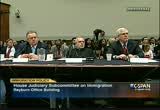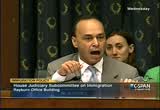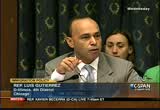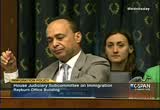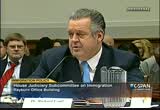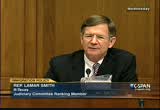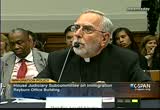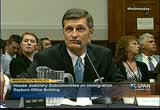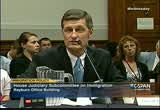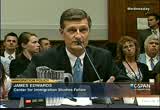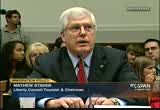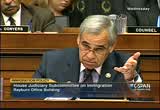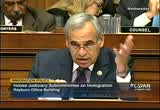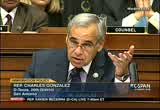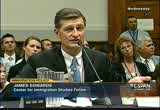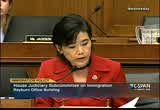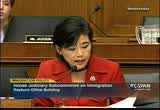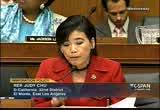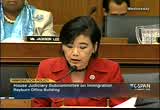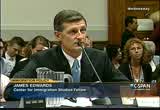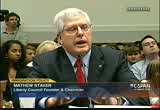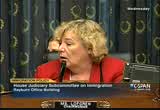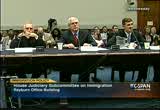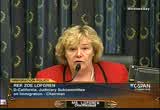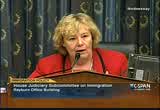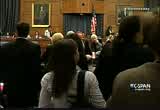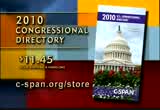tv Today in Washington CSPAN July 15, 2010 6:00am-7:00am EDT
6:00 am
matter those people who had put down roots in the community ought to be treated differently than those who had not. if i could ask you just one, two, three, four -- well -- >> that would be for your to determine. >> no. i'm asking your opinion. >> i would say you have to have a sliding scale. >> where would it start? >> those who have been here 20 years, for instance, would have less of a time of waiting -- >> okay. >> -- and we would move up. you'd have to set some arbitrary date. >> i know. i'd like to know what your opinion is. when does someone have sufficient roots in the community? one year, two years, three years, four years? >> that's probably above my pay grade, sir. >> all right. bishop. >> could you turn your microphone -- yeah. >> reform means to bring people out of the shadows. and to the extent that we can do that comprehensively, that would be our encouragement. >> so i guess you would say if they'd been here a day? >> certainly they should be some cutoff. >> what should that be?
6:01 am
>> i would say minimum perhaps a year. >> sir. >> congressman, i don't have a imagine it bullet as to when that time would be, but i would agree there would be some kind of sliding scale. however, because that is a difficult question, and there are many difficult questions, that question alone and any others that we face should not be used to obfuscate or delay a passage of some kind of -- >> with all due respect, sure, i'm not asking to obfuscate. this is a very difficult issue. i spen ten years trying to get it done the first time around, and these are theifficult things we have to do. and when you're talking about trying to have a balance between what you say is fair treatment for those who have been here illegally, that is, immigration, illegal immigrants and the rule of law, you have to determine that. and so, question is do you think that is a public policy issue we have to deal with? that is, shouldn't there be a differentiation between people who have been here five years and just got here, number one, and number two, do you not
6:02 am
understand that if you make it so close to the time of illegal entry it encourages others to come in the future and you will never have a perm nuclear weapon law? >> i agree with you on that point clearly. and certainly i think you do need to have some kind of scale, and you have to be careful that if you say you're going to provide this that you don't have all of a sudden a flood of immigration that's illegal that people want to take advantage of what we're trying to address here. >> let me ask this question of the three of you. when we passed this law in 1986 we made the statement it would be a one time only because we thought it was a one-time-only phenomenon and that one of the reasons we did that was we did not want to encourage continuing illegal immigration. and we were afraid that if it were viewed as a sequential thing, do one now, do one in 20 years, another one in 20 years, it would defeat the purpose of securing the border. do you understand that and is that something we ought to be
6:03 am
concerned about? >> yes, sir. that's why i said border security first. and when i mean secure the border i mean you ha control of the border. you decide. >> how do we answer the question that we did this once before, said the it was going to be the only time we did it and now we want to do it again? >> the federal government didn't enforce the law and haven't enforced the law for 24 years. that'shat's bred disrespect for the law under republican and democratic administrations. our own federal government has chosen not to enforce etc. own laws. >> bishop? >> illegal immigration is not good for anyone. it's not good for the person crossing the desert at risk to their own life. it's not good for a country not to know who is crossing its border. so definitely if there is an earned pathway for those who are here, it wl provide them legal entry, if there is a worker program connected to the reform, so tt there is a legal way for people to come. >> should that worker program allow them to bring their families with them, or should bit a temporary worker program in which they come to the united
6:04 am
states for let's say ten months out of the year and then return to their home country after ten nths, although they could then return in the following year? >> the church has always been insistent on family integration. the separation of families is not helpful. it's not helpful to the family. it's not helpful to the society. so to whatever extt possible, family should be keptogether in a worker program if that's feasible. >> so they should be treated better than our men and women in the armed forces who are separated for 10, 12, 18 months deployment. >> well, that's an entirely different situation. >> i understand. >> it's not analogous, really. >> the other thing i would ask you, do you recall the s.a.w. program and the r.a.w. program in the 1986 law? do you think that worked well? >> i know that there are
6:05 am
concerns in terms of, for example, in yuma, which is a huge agricultural workforce. and the need to bring workers over the border. and there's been great concern about the fact that they have to build housing and they have to find a way to retain people when rely the intention of people is to go back home. they want to be back home with their families. >> that's a different thing. the only thing i'm just trying to mention for you and for my colleagues is we put a seasonal agricultural worker program and a replenishment agricultural program in the 1986 law. as opposed to a specific temporary worker program. unfortunately, the s.a.w./r.a.w. program had the greatest amount of fraud of any program i know and we were noable to police it, and many people made assertions that they had worked in agriculture during the period of time we required who hadn't. and it became a backdoor way of getting in the united states even though you didn't have --
6:06 am
you didn't meet the qualifications. i've overstayed my time. i just want to say this, though. as we talk about treating people fairly, i have to also think about the people in mexico, the people in africa, the people in the philippines, the people in europe, the the people all over the world who have followed the law. in the 1970s we changed our law to have a worldwide quota system, which was supposed to mean that everybody had an equal chance to get in the united states. and when you have rampant illegal immigration, significantly from any portion of the world, it -- it makes it unfair to those who have wted in line. and i have to say this. as we go forward -- and i hope we do do something -- as we go forward, you should also think of what it does or says to those people who followed the law, who have been waitg ten years, to 20 years in the philippines to come here, in africa to come here, in mexico to come here, and what does it say to them if we say you were the saps and
6:07 am
those that broke the law came here are frankly going to be treated differently? and i'm not sayinghat's the answer, but i say we also have to understand what fairness, what justice means to those who did follow the law. thank you very much. >> gentleman yields back. i understand that miss jackson lee is prepared for her questions and will be recognized for five minutes. >> madam chair, thank you so very much for this very important hearing. i could not acknowledge the clergy here today without acknowledging in my hometown of houston, reverend clements of the national baptist convention and bishop kyles among many others who have led a very potent and important convening of souls who have supported and understood the eics and the
6:08 am
humanitarianism of real comprehensive immigration reform. and i'm humbled by the sincerity of my colleague from california, and i believe that he is sincere. but i think it is important to maybe go against the grain of a familiar refrain in a song that says, as i remember, tiptoe through the tulips. and i think that we are tiptoeing through the tulips. i would adhere to the fact that once a law is passed, we should be meticulous in how it's implemented. reverend land, i believe that your controversial statement to some should be on the table. but we must have it on the table where we can all discuss i in its implementation and so you can hear the cons for tse of us who may not agree and we can hear the fors. but the good news would be that we have moved forward. i've worked for a very large
6:09 am
nondenominational church to give them relief for one of their evangelistic workers who didn't meet a standard to get a visa to be able to come in, and we attempted to change the law, i think we worked on it because it said a catholic for a catholic, a baptist for a baptist, and we said it should just be a religious worker so that people could come in and help to save souls. but the greatest impediment for passing legislation -- and i refer to legislation that i have, safe american corehensive immigration act, and i refer to one that has drawn many, many esponses, hr-4321, i call it ortiz, which you would be shocked. maybe you've read it. please read it. it has pages and pages and pages of border secity provisions, ones that if you took a moment to read it you would understand that we are reasonable, we're
6:10 am
responsible, and we're compassionate. so the one major impediment is the republican party. every single republican is committed to denying, denouncing, and insuring that this president fails on immigration reform, that this congress fails on immigration reform, and you tell me, how do we overcome that kind of mind-set? nothing you can say here today -- you could take wings and fly around this room. you could create the opportunity and president land is looking for an opportunity to fly. as they say, let me fly where the eagles fly. you could fly with the eagles, and you would not gethem to get past the political schism that they have. let me share with you some numbers that i want to put into the record. 1994, 6.9%, 1995, 5.59%, 1996,
6:11 am
5.41%, 1997, 4.94%, 1998, 4.5%, 1999, 4.22%, 2000, 3.97%. u.s. department of labor unemployment figures. i was a ranking member of the immigration subcommittee during that period when republicans were in charge under newt gingrich and under the subsequent speaker of the house. we could not move immigration reform, and we had the lowest unemployment that we could ever have. it bothers me now to use the excuse of unemployment for that. could i ask the crgy quickly to -- and if i could start with president land, what do we do about senator mccain and senator graham, who committed to us to work together in a bipartisan way?
6:12 am
i don't think this should be a single-party issue. it should be an sue for america. and let me remind everyone that the idea of immigration reform is to take care of those who are stranded here in this country. president land, what should we do with that mind-set that no immigration reform will pass as long as i'm a republican in the united states congress? which i am not. >> well, i think congressman lee, my home -- you represent my hometown of houston, and -- >> good to see you. >> the texas pastors council just -- it had a press conference last week -- issued a statement on comprehensive immigration reform signed by a lot of conservative baptist pastors and was a multiethnic statement dealing with the texas legislature and their attempt to implement some form of the arizona law. and i know some of those churches. those churches are filled with people who vote republican.
6:13 am
i think frankly the country is ahead of you on this issue. i think with all due respect the country is significantly ahead of you on this issue. >> excellent. >> and they're waiting for leaderip, they're waiting for statesmanship. i believe that there is -- there is -- the foundation and the building materials and the blueprint for a sen triggs comprehensive immigration reform package is there. it's out there in the country waiting to be constructed by people who are willing to be statesmen. as you know, churchill said politicians think about the next election. statesmen think about the next generation. this issue is rending the social fabric of the nation. the arizona law and the attempts to implement the arizona law shows there's great frustration with the lack of federal government comprehensive immigration reform and the federal government enforcing its own laws.
6:14 am
it breeds disrespect for the rule of law when the foft ignores its own law. any fair observation of what's happened in the last 24 years is that more often than not our own federal government has just ignored its own laws when it comes to border security and when it comes to immration enforcement. and let's understand, as well, that we as a nation bear some responsibility for that because we are a government of the people by the people and for the people. we've had two signs up at the boer for at least the last two decades. one says "no trespassing" and the other says "help wanted." the vast majority of these people have broken the law in order to come here and work. >> absolutely. >> whereas your domestic lawbreakers break the law in order not to work. they've been able to do it because the jobs are there -- and by the way, i've seen studies that show that undocumented workers lower the
6:15 am
wage wages of those at the lower end of wage scale by approximately 10%. all workers, documented and undocumented. so that if we had comprehensive immigration reform it would have the impact of raising the wage scale by about 10% at the lower echelons, where 10% makes a real difference. and would make a difference in the living standard of those who are in the lower echelons of our society. so what i'm doing is i'm saying this is not an issue of right and left. it's not an issue of republican and democrat. it's an issue of right and wrong. encouraging people to talk to their congressmen and their senators, i didn't know what the texas houston pastors were doing until they informed me and they said thank you foryour leadership in orlando, and we're going to respond to what's being attempted in austin. and i can assure you that the
6:16 am
churches -- that the pastors that are there, a sigma joe torre of them vote republican. >> the jept llady's time has expired. >> i thank you very much. >> gentlelady from california, miss waters, is recognized. >> thank you very much, madam chairwoman. i appreciate your holding this hearing today. it's very important that we create a discussion and a debate about immigration reform. and it's very important that the government accept -- the federal government -- responsibility for immigration reform. i'm pleased that we have witnesses here today. several times i've heard my colleagues talk about trying to create a reasonable discussion of where republicans and democrats can get together and really talk about this issue in ways that will help to solve the problem. but i'm finding, as i learn about some of the reasons for
6:17 am
opposition to immigration reform, is that we are so far apart philosophically that i don't know how we're going to be able to really get together and have this debate and this discussion. let me -- i was intrigued by the testimony of james r. edwards jr., ph. today and this discussion about the ability for christians to display and implement compassion and mercy but that governments can't do that, that governments should not attempt to use this civil responsibility in that way that it can be more harmful than not. let me find out a little bit more. to ask myself, find out who this gentleman is. and as we understand it, you,
6:18 am
sir, as a fellow at the center for immigration study. is that right? >> yes, ma'am. >> are you familiar with the case of eduar gonzalez? >> no, ma'am. >> eduardo gonzalez i guess is being deployed on his third tour of duty with the u.s. navy. and he has or will be serving on the "uss harry truman" in the persian gulf. hi wife is not a u.s. citizen, and they face deportation, and their deportation was advocated for and sought out by the center where you did your studying, your -- where you were a fellow. do you support that kind of deportation of the family of someone who is deployed to serve to protect the united states of
6:19 am
america? >> well, not knowing the facts of that specific case, i hesitate to comment directly on that but i would say in general that there are elements in the law that allow exceptions in certain cases, and that may well qualify as the exception. >> but the center advocated for his deportation. do you believe that someone who serves in the united states armed forces should have to worry about their family being deported because they are not -- the wife, the child are not citizens? do you think that's right? or is it government should not be compassionate enough to consider the plight of the wife and the child because that's not our role, as you have articulad in your testimony about the role of government or
6:20 am
the -- >> what ve said in the testimony is that it's clear from scripture the role of government properly is moron the justice side. and certainly we have elements of compassion or mercy that play out in our -- are reflted in our gornment, which i would agree, as congressman gutierrez noted earlier, that should be reflected to an extent. and things such as in general where it applies very evenhandedly, such as the role of due process or punishment that fits the offense. >> in your testimony, if i may, in closing, this is what you say. "it would be unwise to misapply biblical principles in any public policy area. this is true with respecto immigration. immigration," you say, "is one
6:21 am
of those issues in which scripture does not detail al public policy. this issue differs from clear-cut biblical preaccepts such as prohibiting murder, stealing, or perjury. thus we have to consider such biblical principles to appropriately apply carefully -- thus we have to consider which biblical principles do appropriately apply, carefully assess the situation at hand, consider this nation's experience and unique characteristics, judiciously estimate it will various policy options and then exercise prudent judgment." i'm clear about that. that puts u a ng way apart. and let me tell you why, particularly with this separation issue. i'm in the process of reading three books right now. one is known as "the known world." the her is known as "the wench." and of course i'm reading the
6:22 am
biography of the british legislator and abolitionist mr. wilbur force. all of these books are about slavery. and i have decided to spend a lot of time trying to understand not only what took place during slavery, but the implications of that even today. one of the most vicious and heartwrenching components of slavery was the separation of families where children were sold off, where fathers were sold off. and when we look at this immigration issue, it emerges again that families could be separated, children coul separated from their parents. what do you think government's role is in looking at this family situation where families could be separated? what's the role of christianity?
6:23 am
what's the role of religion in looking at this? and what is government's role? >> the gentlelady's time has expired. by unanimous consent, we'll grant the gentleman 30 seconds to respond. >> whereo i start? in general, i'd say that there's a distinction between those who knowingly broke a law and took a chance and would be separated by their family if they were caught and held tocertain -- whatever consequences, be it imprisonment or whatever. i mean, it's the same story as an embezzler or any other person who breaks the law, would be separated from their family members. the person who comes heres a lawful permanent resident played by the rules and is separated because of the quota of waiting the turn of his spouse and minor children because the citizens who came here before him are
6:24 am
joined more quickly with their -- their more extended family members. to me, that's a family separation issue of greater import to the government. and it would be more compassionate to join the spouses and minor children than to prioritize more distant family members? >> the gentleman's time is expired. i know dr. land has t leave in about 15 inutes. so i'm hoping we can get to all our members. >> attached to my testimony that was submitted to the committee in appendix five is principles for just immigration reform where we try -- dr. barrett duke, who has a ph.d. in old testament studies, and i who have a ph.d. in theoloologtheolo take the biblical teachings and apply them to what we perceive as being an ethical immigration
6:25 am
policy. it's much too long to go into, but i would refer you to it. >> thank you, and we will commend that to our committee. mr. guerrez is recognized for five minutes. >> thank you, madam chair. i want to go back to dr. richard land. temper proof biometric social security card. it's in our bill. we want to make sure, because i agree with you totally. you want to end illegal immigration, tell them they can't get a job in america. now, i'm saying that. i'm about as pro immigrant as you can get. tell them they can't get a job in america, that we're going to end illegal immigration and we're going to end it once and for all. let's not -- let's just confess to ourselves. 1986 was a good start. but it was a fraud bill. and it was in essence amnesty to the extent that people applied -- you have been here four years, you show up at an office, you go through a quasibackground check, and guess what, 18 months later, you go
6:26 am
from temporary resident to permanent resident. the law was passed in 1986. i got elected to congress in 1993. in 1994, i started at the beginning of a process that brought up 50,000 peoplen my district to become american citizens from that bill. so you see how quickly people went from 1986, they didn't open up the firs office till 1998, but by 1994, they were already applying for american citizenship. that's pretty much it. that is not what our bill says today. what our bill says today, you have to go to back of the line. people keep -- they make fun of this back of the line. it's nothing to be made fun of. the back of the line is a long time away from you ever becoming an american citizen and gaining permanency in the united states of america, because what we do is we're fily friendly. so we say all of those people that are waiting in line, during the next five years they will recee their visas. in theext five years, in any comp henszive bill, you must
6:27 am
take -- it is immoral, wrong, unethical to make someone wait 25 years to bring their brother to america when we know that will they're on the brink of dying, that their life is all but done. that's not our law. our law is to bring families together. so what we say is let's put them -- and once everybody that's in line and has been waiting lawly in line is taken care of, then you begin with those that are undocumented. but yoplace them somewhere in the line. and all i want to say to everybody is think about it a moment, think abt it a moment, if we create a system that doesn't allow people to ultimately become american citizens, reason we undermining our country? isn't that what we want is people to come here, to invest themselves, not only economic but socially but in terms of their heart and their soul by saying this is my country and adopting the united states and folling that position? that's why we're not like other countries. that's why america has become the cemetery of so many foreign languages. think about it.
6:28 am
germans came, buried germans. polish came, buried italian. we continue burying languages. english continues to be the language of the nation. why? because we've allowed them to integrate themselves fully. so this is really -- i want to thank you all because this is really -- we agree with you, biometric, leaders of our faith-based community begin to speak simple, clear facts. we need that. we need . land and bishop, we need to make sure we secure that border and do everything. and if we need to get metrics to figure it out, let's figure out what those bet meth ricks are so we can sure that border. but we need to secure everything totally. we agree with that. we need to punish those employers that exploit them. we agree. every democrat here on this side is ready to put themto jail for long jail sentences if they hire undocumented workers and illegal workers in this country. now, after hearing all of this, you say, well, what's the
6:29 am
problem, luis? you're for securing the border. you're for a biometric card. you're for pting employers in jail. that'soing to be the solution to ending illegal -- what's the problem, luis? the problem is what do we do with the 12 million undocumented workers that are already here? and you know what, you've heard it again here today so i want to thank especially i want to thank the reverend matthew staver. it isn't amnesty. you know what they've done with amnesty? they've chged it from a seven-letter word to the dirtiest four-letter word there can be. if today were halloween instead of kids knocking on their door and saying boo, they would say amnesty as though to scare us once again. that's what they've done with the word a word that has no relatiship with what we are doing. what we are saying is, quite simply, now, you know, it's beme the norm here not to speak about charity, not to speak about forgiveness, not to
6:30 am
speak about -- look, i'm not a theologian. i didn't come here with my bible. i'm a good catholic, you know. but i tell you, i learned two things, to love god above everything else and to love my neighbor as i love myself. and let me tell you, i cannot fulfill my principle if when i sit in the pew and i know the person sitting in that pew next to me is undocumented and i don't love them as much. when i register my kids to go to school -- and this is not hyperbole. when i register them in first and second and third grade, when i take them to school, i know there are undocument children. when i go to teacher/parent conferences, when i go to the pa, everywhere i go, they are there. they are an integral part of my life. they're so ingrained in our life. they are our neighbor not only in the spiritual sense but in the factual sense. they live next to us. they live among us. 4 million american citizen children. hundreds of thousands of american citizen wives. hundreds of thousands. and husbands who are married to undocumented. do you really propose that the government go out there and
6:31 am
destroy these families? do you know what it would do to the fabric of american society to tak 12 million people and rip them asunder? it is not reasonable. so what i suggest to all of you is that we meet, again, that this testimony is good but you guysot a little different thing than most people that come here. you know, you have a mission in yourlife. you have different objectives and different goals in terms of what you want to . i want to see if you can help us reach those goals. and for that i thank you for the wonderful testimony here this morning. >> the gentleman's time is expired. mr. smith wants to catch his breath. oh, he's ready? the ranking member of the full committee, mr.mith, is recognized for five minutes. >> thank you, madam chair. mr. land, let me direct my first question to you. and i apologize for being gone during your testimony because of having to attend another committee's mark-up. but as i understand it, you do have some concerns about chain migration, and to the extent th you didn't elaborate on
6:32 am
that, could you tell us what aspects of chain migration you would eliminate and which ones you would keep and to the extent that you agree with it, what would you substitu for chain migration? would you put a greater emphasis on those who have the education and skills we need in america, for example? >> well, in appendix five of my testimony, which is attached, i talk about chain migration, the process of bringing extended members of one's family to the united states once one family member is settled here is of significant concern to us and many people in the nation. if we are to allow millions of people to remain here, we must find a way to limit the influx of extended family members so that we leave room in our nation for future immigrants who have no family here. we propose that chain migration be limited to spouses and their natural or adopted children. we recommend that hardship exceptions be part of the limits to enable children to bring elderly parents to the u.s. who have no means of support in
6:33 am
their home countries in order to maintain our commitment to bringing in additional immigrants, we recommend the number of family members who can be united with family members in the u.s. be subbed to an annual cap. >> thank you. >> the reason for that is otherwise you get into numbers that are extremely large. right. okay. thank you. >> a hard decision, but that's the decision we recommend. >> right. thank you for that answer, and it is appreciated. bishop, i know that the conference of catholic bishops does not -- or claims not to support open borders. my question to you is what illegal imgrants would you agree to deport or not admit in the case of those individuals that we might send home, would you agree to send individuals home, for example, who had been convicted of crimes? would you agree to send individuals home who were working illegally in the united states? i want to gi you an opportunity to show that you're
6:34 am
not just for open borders, that you do agree to enforce some immigration laws. >> yes. clearly, the bishops of the united states do not support open borders. we call for border security to address appropriate issues that are concerns along the border. for example, drug trafficking, human trafficking, weapons smuggling. these e all serious issues. >> what about the category of individuals i asked specifically about? would you deport or support deporting those indivuals who had been convicted of crimes and those individuals who were working illegally in the united states? >> i thi we would certainly support a judicial decision that someone should be deported or -- >> would you deport individuals in those go categories? >> i missed the second category. the category was those who have committed crimes -- >> those who have been convicted of crimes and those who have been found to have been working illegally in the united states.
6:35 am
there seems to be bipartisan agreement on those two categories of individuals. i just wondered if you all as a conference ao supported the deportation of those individuals. >> what we support is comp henszive immigration policy reform. >> right. what about individuals -- >> wh regard to deportation, clearly this is something that the government has to determine, who should be deported. >> no. i understand that. my question is does the conference support deporting individualwho have been convicted of crimes and who have been found to be working illegally in the united states? yes or no. does the conference have a view on that? >> that really isn't -- i mean, the position of the conference is to form our immigration policy. now, the issue of deportation is affected by a comprehensive immigration policy. >> you're not willing to state those individuals should be deported. it sounds to me if you're not, then i don't know who you would agree to deport if any. >> it's not a matter of d
6:36 am
agreeing to deport. the government determines who is deported. the church doesn't. we wouldn't stand in the way. what we do is try to assist people on the other side of the border who have been deported. that's what the church -- >> i don't think i'm going to get a fur answer to my question, but i thank you for your response. any remaining time i have i'm going to yield to the ranking member. but mr. edwards, a question for you. do you consider comprehensive immigration reform so-called is equivalent of amnesty or not and if so, why? >> i do consider it amnesty and because the parameters of what is proposed in the 2006 bills in the nate and 2007, the most recent proposals on the table, they have about the same exact requirements, a de minimis sort of fine or fee, you know, some modest steps toward english, but there's no real requirement of acquisition of english language.
6:37 am
there's -- you know, a number of other things are pretty small potatoes and exactly like congressman king said the -- those things are actually benefits to the people who -- in the most part are benefits to the people who are the benefits of the legalization. and that's -- they're going to beetter off if they learn english. they're going to be in better stead for the future. if you wanted to look at real things and take into account what congressman gutierrez said, that, yes, generally, you want erybody who comes here leg, even people illegally, to form a positive emotional and cultural attachment to this nation and a
6:38 am
loyalty, a polical or patriotic loyalty to this nation. but that doesn't mean that everybody should be able to go the entire route to citizenship. you may consider that there are disabilities attached to people who are beneficiaries, and you've got to sort out all the distinctions. i mean, some people who have been here 20 years, some people 20 days, some people have education, some people don't, and some people have citizen children, some don't. you've got to design something that sets up all of that and deals with each of those specific groups in a way, and some of those may befit from naturalization, citizenship, but others may not. but you need to think long and hard about exactly who should be held to what standard. >> gentleman -- >> thank you, mr. edwards. thank you, madam chair. >> madam chair, may i have two
6:39 am
minutes? >> without objection, yes, sir. >> thank you. i think i've technically got to be the one to ask for the two minutes, but i'll be happy to do so. >> we're very cooperative in the running ofhe hearings. >> i just again want to thank everybody here for being here on this important issue and again encourage you to contue this dialogue. it's very critically important. more than i review immigration laws throughout the history of america, and we've had many, every time we have taken an anti-immigration position, it has been the wrong side of history. when i was recently in jerusalem in january and february this year, i came across a letter that was startling. it was from a member of congress to our then president. it was regarding this ship that wasilled with people fleeing the holocaust, the jews that were fleeing hitler's regime, and they were circumstance nlg the atlantic, wanting to land on the shores of america. he wrote a letter to the president, urging him not to move forward with immigration reform, urging him to deny that ship's entrance, which we eventually did. the same arguments that were
6:40 am
raised in that let rer the same arguments we hear today with regards to jobs, diluting our economy, diluting our culture. we were on the wrong side of history then, and i urge us not to be on the wrong side of history now. thank you. >> thank you, dean. i recognize mr. gonzalez from -- collgue from texas for five minutes. ? thank you very much, madam chair. my questions will be directed to dr. edwards, and i'm going to be reading from your written testimony as well as some previous remarks attributed to you. "we fairly conclude judgment to constrt an immigration policy for 21st century america based on a handful of scripture passages taken out of context." in your written testimony today you madeeference to some of those, and you also comment, "but to attempt require civil authority to display the same manner of mercy or compassion that individual christians are commanded to display would be
6:41 am
ludicrous. yet that is what certain advocates in the immigration debate unreasonably demand. i'm not real sure where u make reference to as certain advocates making that kind of a demand, because that's not been the testimony of the other witnesses here today, nor of any member here on the democratic side. but let me ask you this. you say, but do these high standards apply to civil government? and then you say to an extent. so i'm going to take some of those passages, andou know what, i don't think you're entirely wrong. you're substantially wrong but not entirely wrong. so to care for the least of these my brother. all right. maybe government should don't that. maybe civilian authorities shouldn't do that. love your enemies. difficult thing to do in time of war. bless those who curse you. we don't really turn the other cheek all the time. love mercy. walk humbly. no o may vote for me if i love
6:42 am
mercy and walk humbly. maybe you're right. you left one out. to act justly. to ak act justly. i think that does have application, whether it's in the religious sphere or whether it's in goverent service. would you agree to act justly is an objective or a goal that should be sought by all? >> well, earlier in the testimony i did cite micah 6:8 in full where it does say act justly, and i fully agree that -- >> i'm quoting you. >> yes, sir. >> because act justly seems to be one where you would find a lot of disagreement that it may not have an application as we form public policy here in congress. to act justly. actually, that's what i thought we were all elected to do, fundamentally. so you would agree that that's one passage, whether taken out of context or not, has application in what we seek to do here today. to act justly.
6:43 am
>> that is one passage, and, in fact, it is not out of context because there are so many other passages, and the reference point is scripture best taken is to scripture interprets itself. >> to act justly. >> you have to take it as a whole, and it is very clear from scripture that the principle of justice and acting justly is fully in order. but it's for individual christian -- >> so you're -- that is a long answer to say yes, you would agree with my proposition to act justly, is something we should all seek regardless of context, regardless of our roles. right? is the present immigration law on the books just? is it fair? is it just? >> in general. it's got a lot of weaknesses because it's a political decision. but it's -- it has in general
6:44 am
elements of justice. it is thought through and in many regards it allows for exceptions, kind of merciful exceptions on a case-by-case basis such as parole -- >> let me ask you, is it just to view the 12 million workers and their families in this country as someone that is leer illegally without any chance of remaining in this country? because it appears to me that you agree with some on the other side of aisle that anything short of deportation would be amnesty. because that's all you have provided us today. for the 12 million workers and their family, and they're all not from mexico, by the way, or south of the border, one size would fit all, that they would be deported. is that justice? >> no, sir. >> and so you would agree that we need to reform our laws and find exactly what the other witnesses have spoken to today,
6:45 am
find an answer or solution that is fair and just. and we've been talking about an earned pathway to legal status that does include penalty. in every courtroom in the united states, whether t's administrative, criminal, or civil, where there are penalties and punishments, there are gradations, not everyone -- it's not one size fits all. and people are basically also placed on a probationary period. if they don't comply, then the full import of the law or punishment or consequence would be visited on. but what i'm hearing from the other side and from you today, it's not just, and it is not fair. and that's what we're attempting to do here today. so i welcome and i appreciate the testimony of the other witnesses, and i hope that we can move forward. and i yield back.
6:46 am
>> thank you. the gentleman's time has expired. the gentleman from -- >> may i respond? >> i think that wou be fair. by unanimous consent, the gentleman is granted an additional 30 seconds so you may respond. >> thank you. what i was trying to say earlier is very much in line with what you're pointing out, you cannot treat all of the 11 million currently illegal aliens exactly the same because some have been here 20 years, others ha been here 20 days. some have families, some don't. vom u.s. citizen children, others have no children. you've got to design very specific penalties according to each of those categories of circumstance. that would be the prudent approach rather than saying everybody gets to stay here forever and become a u.s. citizen regardless of whether you just crossed any border or whether you overstayed a visa or
6:47 am
whatever. i think exactly as congressman gutierrez pointed out earlier, it would be well in order to deal with the problem of visa overstays. >> the gentleman's time has expired. and the gently day from california, miss chu, is recognized for five minutes. >> i'd like to ask some questions pertaining to labor and jobs. and first i'd like to ask dr. edwards and then have a response from reverend staver. i'm particularly disturbed by your testimony, dr. edwards, where you state that harvard economist george berhas has attributed immigration with directly reducing the yearly average native born men's wages by 40%, and i'm d distushed because you only tell part of the story. citing the statistic alone is misleading because you failed to mention that while immigration reduces the wages of native workers by 3.4% over the short run, he finds that immigration has no effect on such wages over
6:48 am
the long run. in fact, it's a 0% effect on such wages. and you also fail to mention that the majority of economists who write on this issue, such as david carr, giovanni perry, rachel freeburg, jennifer hunt, gerald james, differ from boarhaus and conclude that immigration has actually had a positive effect on the wages of most if not all americans, and this is because, for one, immigran buy things and increase demand on products and services, secondly, immigrants tend to work in industries that, like aiculture and landscaping and certain parent of the u.s. would become unviable without their labor, and thirdly, immigrants tend to complement american workers rather than directly compete against them. and let's just take the example of agriculture. we do have exceedingly high unemployment levels right now, but for all the unemployment out there, americans are not running back to the fields to do certain manual labor.
6:49 am
and this has bn highlighted by the take our jobs campaign being run by the united farm workers and discsed on the stephen colbert show. farm workers are saying to america, you want our jobs, come take it. but after months of advertising thisarticular campaign where they actually encouraged people to come take these jobs, only 60 people signed up and only three have made it to the fields. and, in fact, therare estimates that there are 2.5 million undocumented farm workers and their families in the u.s. but without them, we don't grow citrus, berries, tomato tomatoes, and other fruit. our food would not be able to compete with the cheaper food from overseas, and if our farms go away, it's not just farm work that goes away, it's all the jobs that go along with it, such as packaging, processing, trucking, accounting, advertising. that all goes away, and these are jobs that are actually held
6:50 am
by americans. in other words, if you send the farm workers home, you eliminate millions of american jobs. any farmer will tell you that. so, dr. edwards, what would you have to say about the fact that most labor economistins have fod that immigration has had a positive effect on the wages of americans, and also if we lost the undocumented farm workers, would you still be in favor of rounding them up and shipping them home, considering so many americans in complementary jobs would lose their jobs? where would we get the people to perform the jobs of farm workers? >> again, where do i start? if you take boarhaus' work as a whole, including his entire work, his book called "heaven's door" and other of his scholarly publications -- i've read a good
6:51 am
t of boarhaus and other economists in general -- this is the case that where there are more people the labor force there are lower wages. where there are the ability to substitute capital for labor, that is mechanicization, which happen ithe tomato industry, we ended up with fewer jobs in california particularly and the tomato industry, but they were higher-paying jobs, they were better-quality jobs, there was much more productivity and output. and this is a much more complicated subject than i can answer in 30 seconds. but the tth is that there are plenty of people who would, if the wages naturally were to rise because of the tighter labor market, might be attracted to different sectors. maybe not as stoop labor but for
6:52 am
other mechanized jobs in the agriculture sector. >> reverend staver? >> thank you. i think the idea that if you just simply -- this is not -- that this is going to adversely affect the economy is an oversight, because anybody who's lived in florida or texas or some of these other agricultural states -- and i was raised in florida -- knows that there's a lot of vegetables and flowers and agriculture that's grown there, and a lot of these individuals are illegal. they're undocumented workers. if you all of a sudden ship them back to wherever they have originated from, you're simply not going to have those fields and those employers filled with individuals clamoring to go out there and give us what we enjoy as americans when we eat a watermelon or a tomato or have salads. those come from someplace. they don't come out of thin air. and if we were just to simply ship everyone back, that's going to have a negative impact on our economy and on our way of life.
6:53 am
i think that what we ultimately see is that argument being used throughout history. we have continually addressed this issue of immigration. we have historically been oppose to immigration against various kinds of identifiable groups, whether they are italians at one particular time that have our disfavor, whether they're asians that have our disfavor or japanese or chinese or other people of asianescent or jewsuring the holocaust, now it seems as though it's the latinos. and those primarily coming from mexico. every time we've had that issue we've always raised the issue that if we allow these individuals they're going to take our jobs. historically that has been absolutely proven incorrect. moreover, i think we need to not stereotype every one of these that are illal or undocumented workers or immigrants here. that's not just mexicans. it's not just italians. there are some other indiduals from all different kinds of descents, from all different spectrums of the world.
6:54 am
and we can't just have this cookie-cutter approach to simply say cause they wl affect our jobs we will ship them all back overseas. i think that's not appropriate. it's not a just, not a moral, not an ethical approach. >> the gentlelady's time has expired. we have, smaflt, aas a matter o all of the members have had an opportunity to ask questions. i understand miss jackson lee has a unanimous consent request. >> i ask unanimous consent to conclude with a comment i did not get a chance for my opening comment. i just want mod make one brief comment. >> without objection, the gentlelady is granted one minute. >> thank you. to all of the participants and panelists, let me thank you very much. and president land, because of our houston connection, let me make it very clear how excite i am about the bipartisanship of our congregio, many of whom i worship with, and of course many constituents in my own district are republicans because they're americans. what i would ask, as you proceed, and what i wanted the
6:55 am
action item to be is to be ever pressing on those names and others classified in one party, i'm talking to everyone, to give them the message that you're giving, otherwise we will not move forward, and to give dr. edwards a rebuttal answer to what he has articulated, because with much respect, it is wrong. when we had low unemployment, republicans blocked us from moving. and i'm speaking not of the constituency but of the elected body. what i would pray for, and i truly pray for it, that we distinguish the 12 million undocumented here in the country. that is where the crisis is, and we made it very clear, put them on the back of the line, let them work. when they work, others work. it is well-known. so my challenge to you and my question, and i would like to be part of it, is to convince dr. edwards, because he carries the banner for those who think they can hide under this banner of religiousness, i would ask that we work with those who are
6:56 am
blocking us in the senate and blocking us many the house in a -- >> the gentlelady's time has expired. >> i yield back. >> i would like to thank all of the witnesses for being here today. a lot of people don't realize the witnesses come as volunteers to help our country, and i think you all have helped our country today. with your testimony, both oral and written, it's thoughtful, and it's been very helpful. a little housekeeping here. the members of the subcommittee will have five legislative days to submit any additional written questions to you, and if that occur, we would request that you answer those promptly so that they can be made part of the record. and without objection, the record will remain open for five legislative days for the submission of any other additional materials. i would just like to note that i learned some things today. it's always a good day when you learn something. and as i listen to you, i became
6:57 am
hopeful. too often here in washington we're at loggerheads, but i think what i heard today is that people who can disaee on many, many other things can come together in a thoughtful, rational, cool-headed manner to say what's good for our country, how do we solve problems that's our job. and i think you are leading us in that regard. as mr. rman said, doing nothing is the soft amnesty. you know, anywhere i go, no one says do nothing about this, whatever people think on the subject. so i do hope that we will be able to pull together across the aisle and across our country. viously, america has the right to decide who's going to come and join us and become americans here with us. that is an obligation that we have. but our rh histo shows that
6:58 am
141 Views
IN COLLECTIONS
CSPAN Television Archive
Television Archive  Television Archive News Search Service
Television Archive News Search Service 
Uploaded by TV Archive on

 Live Music Archive
Live Music Archive Librivox Free Audio
Librivox Free Audio Metropolitan Museum
Metropolitan Museum Cleveland Museum of Art
Cleveland Museum of Art Internet Arcade
Internet Arcade Console Living Room
Console Living Room Books to Borrow
Books to Borrow Open Library
Open Library TV News
TV News Understanding 9/11
Understanding 9/11
